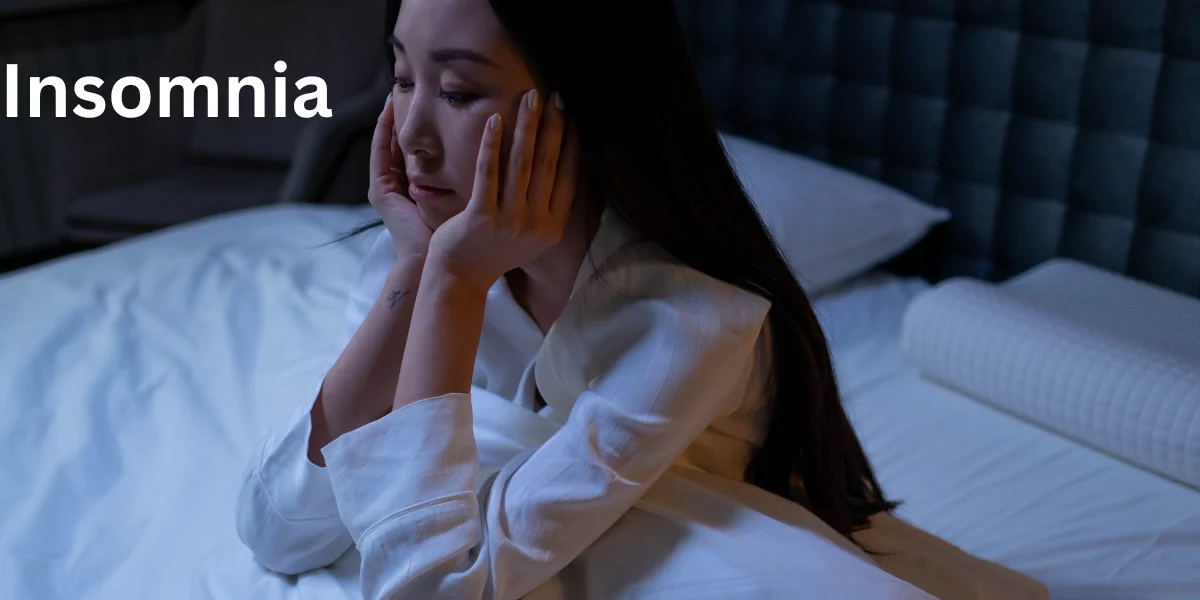Insomnia is a common sleep disorder characterized by difficulty falling or staying asleep, or waking up too early and being unable to fall back asleep. It can affect people of all ages, although it is more common in adults and in women. Insomnia can be caused by a variety of factors, including stress, anxiety, depression, medications, and certain medical conditions. The effects of insomnia can be far-reaching, leading to daytime fatigue, irritability, difficulty concentrating, and decreased productivity. Treatment options for insomnia include lifestyle changes, therapy, and medication, and a healthcare professional can help determine the best course of action for an individual’s specific situation.in this blog post we will discuss more about Insomnia.

What is insomnia?
Insomnia is a sleep disorder where a person has trouble falling asleep, staying asleep, or waking up too early and not being able to fall back asleep. It can be caused by stress, anxiety, depression, medication, or medical conditions. Insomnia can make a person feel tired, irritable, and have difficulty concentrating during the day. Treatment may include lifestyle changes, therapy, or medication.
Read more.. sleep apnea
Types
What are the type of insomnia ?
Insomnia can be classified into different types based on various factors such as duration, cause, and severity. Here are some types of insomnia:
1.Acute insomnia: Short-term insomnia that lasts for a few days to a few weeks. It is often caused by stress, jet lag, or a change in sleep environment.
2.Chronic insomnia: Long-term insomnia that lasts for at least three nights a week for three months or longer. It may be caused by medical conditions such as sleep apnea, restless leg syndrome, or depression.
3.Onset insomnia: Difficulty falling asleep at the beginning of the night.
4.Maintenance insomnia: Difficulty staying asleep throughout the night.
5.Comorbid insomnia: Insomnia that occurs in conjunction with another medical or psychiatric condition.
6.Psychophysiological insomnia: Insomnia that is caused by excessive worry about sleep and sleeplessness.
7.Sleep state misperception: A type of insomnia where the person complains of not sleeping well, but their sleep is normal when objectively measured.
What are the symptoms of insomnia?
The symptoms of insomnia can vary depending on the type and severity of the sleep disorder. Some common symptoms of insomnia include:
• Difficulty falling asleep at night
• Waking up frequently during the night
• There are two main types of insomnia:
• Difficulty returning to sleep after waking up
• Waking up too early in the morning
• Feeling tired or fatigued during the day.
• Having trouble concentrating or remembering things
• Feeling irritable or moody
• Having headaches or stomach problems
• Having tension in the muscles
• Decreased performance or productivity at work or school.
We should remember that not everyone who experiences one or more of these symptoms has insomnia. If you suspect that you may have insomnia, it is recommended to speak with a healthcare professional to determine the underlying cause of your symptoms and develop an appropriate treatment plan.
what causes insomnia?
Insomnia can be caused by a variety of factors, including:
1.Psychological factors: stress, anxiety, depression, post-traumatic stress disorder (PTSD), or other emotional disorders can cause insomnia.
2.Medical conditions: chronic pain, asthma, allergies, Parkinson’s disease, Alzheimer’s disease, acid reflux, or sleep apnea can cause insomnia.
3.Lifestyle factors: an irregular sleep schedule, consuming caffeine, nicotine, or alcohol before bedtime, exercising close to bedtime, or working night shifts can all contribute to insomnia.
4.Medications: certain medications like antidepressants, corticosteroids, and blood pressure medications can cause insomnia as a side effect.
5.Environmental factors: a noisy sleeping environment, uncomfortable room temperature, or an uncomfortable bed can all contribute to insomnia.
6.Genetics: Insomnia can run in families, indicating a genetic component to the sleep disorder.
It’s important to identify the underlying cause of insomnia to develop a targeted treatment plan that addresses the root cause of the sleep disorder. A healthcare professional can help determine the cause of your insomnia and recommend appropriate treatment options.
What are the Risk factors for Insomnia?
There are several risk factors for developing insomnia, including:
1.Age: Insomnia is more common in adults over the age of 60.
2.Gender: Women are more likely than men to develop insomnia.
3.Family history: Insomnia can run in families, suggesting a genetic component.
4.Medical conditions: Chronic pain, asthma, allergies, Parkinson’s disease, Alzheimer’s disease, and other medical conditions can increase the risk of insomnia.
5.Mental health disorders: Anxiety, depression, bipolar disorder, and other psychiatric conditions can increase the risk of insomnia.
6.Substance abuse: The use of alcohol, nicotine, and caffeine can disrupt sleep patterns and increase the risk of insomnia.
7.Shift work: Working night shifts or irregular work schedules can disrupt the body’s natural sleep-wake cycle and increase the risk of insomnia.
8.Stress: Stressful life events, such as divorce, job loss, or the death of a loved one, can increase the risk of insomnia.
9.Sleep environment: A noisy or uncomfortable sleeping environment can make it difficult to fall asleep or stay asleep.
Identifying and addressing these risk factors can help reduce the risk of developing insomnia or managing the sleep disorder.
Diagnosis of insomnia
The diagnosis of insomnia typically involves a thorough evaluation of a person’s sleep patterns and medical history. A healthcare professional may use several methods to diagnose insomnia, including:
1.Sleep diary: Keeping a sleep diary to record sleep patterns, sleep quality, and factors that may be affecting sleep.
2.Physical exam: A physical exam to check for medical conditions that may be contributing to insomnia.
3.Psychological evaluation: A psychological evaluation to assess for underlying mental health conditions that may be causing or contributing to insomnia.
4.Sleep study: A sleep study, also known as a polysomnography, to monitor brain activity, breathing patterns, and heart rate during sleep.
5.Blood tests: Blood tests to check for medical conditions that may be causing insomnia, such as thyroid problems or hormonal imbalances.
Once diagnosed, the appropriate treatment plan for insomnia can be determined based on the underlying cause and severity of the sleep disorder. Treatment may include lifestyle changes, therapy, or medication. It is important to seek the advice of a healthcare professional for proper diagnosis and treatment of insomnia.
What are the treatment for insomnia?
The treatment for insomnia can vary depending on the underlying cause and severity of the sleep disorder. Here are some common treatment options for insomnia:
1.Lifestyle changes: This can include practicing good sleep hygiene, such as establishing a regular sleep schedule, avoiding caffeine and alcohol, exercising regularly, and creating a comfortable sleep environment.
2.Cognitive behavioral therapy (CBT): This is a form of therapy that helps to identify and change negative thoughts and behaviors that may be contributing to insomnia.
3.Medications: Over-the-counter or prescription sleep aids may be prescribed by a healthcare professional for short-term use to help with sleep. It is important to note that sleep aids should be used under the guidance of a healthcare professional and not as a long-term solution.
4.Treatment of underlying medical conditions: If insomnia is caused by an underlying medical condition, treating the condition may alleviate the sleep disorder.
5.Relaxation techniques: Techniques such as yoga, meditation, and deep breathing exercises may help to reduce stress and promote relaxation, leading to improved sleep.
5.Sleep restriction therapy: This is a type of CBT that involves limiting the amount of time spent in bed to increase sleep efficiency.
It is important to work with a healthcare professional to develop an individualized treatment plan for insomnia based on the specific needs and underlying causes of the sleep disorder.
Complications of insomnia
What are the negative effects of insomnia ?
Insomnia can have several negative effects on a person’s physical and mental health, as well as their overall quality of life. Here are some common complications associated with insomnia:
1.Daytime fatigue: Insomnia can cause daytime fatigue, which can affect a person’s ability to concentrate, perform tasks, and operate machinery safely.
2.Mood disorders: Chronic insomnia is linked to an increased risk of developing mood disorders, such as depression and anxiety.
3.Decreased immune function: Sleep is important for maintaining a healthy immune system, and chronic insomnia has been linked to a weakened immune system.
4.Increased risk of accidents and injuries: Insomnia can impair a person’s ability to react quickly and make sound decisions, which can increase the risk of accidents and injuries.
5.Cardiovascular problems: Chronic insomnia has been linked to an increased risk of hypertension, heart disease, and stroke.
6.Impaired cognitive function: Insomnia can negatively affect cognitive function, including memory, attention, and decision-making.
7.Poor quality of life: Insomnia can significantly impact a person’s quality of life, leading to reduced productivity, social isolation, and decreased overall well-being.
It is important to seek treatment for insomnia to avoid these potential complications and improve overall health and well-being.
When should I consult with doctor for insomnia ?
You should consider consulting with a healthcare professional if you are experiencing persistent or severe insomnia that is affecting your daily life, including your ability to function at work or in social situations. Some signs that you may need to seek medical attention for insomnia include:
• Difficulty falling asleep or staying asleep on most nights for at least three months.
• Feeling tired or unrefreshed after a night’s sleep.
• Experiencing excessive daytime sleepiness or fatigue.
• Having difficulty concentrating or completing tasks due to sleepiness.
• Feeling irritable, anxious, or depressed due to lack of sleep.
• Using over-the-counter or prescription sleep aids on a regular basis.
• Experiencing insomnia that is interfering with your relationships, work, or other aspects of your life.
If you are experiencing any of these symptoms, it is important to talk to your healthcare professional who can help identify the underlying cause of your insomnia and develop an individualized treatment plan to improve your sleep quality and overall well-being.
Prevention of insomnia
How insomnia prevented?
While there is no guaranteed way to prevent insomnia, there are several lifestyle changes and habits that may help reduce the risk of developing insomnia. Here are some tips for preventing insomnia:
1.Stick to a regular sleep schedule: Try to go to bed and wake up at the same time every day, even on weekends.
2.Create a relaxing bedtime routine: Establish a calming bedtime routine to help signal your body that it’s time to sleep. This may include activities like reading a book, taking a warm bath, or practicing relaxation techniques like meditation or deep breathing exercises.
3.Limit caffeine and alcohol intake: Avoid consuming caffeine or alcohol in the afternoon and evening, as these substances can interfere with sleep quality.
4.Avoid screens before bed: The blue light emitted by electronic devices can suppress the production of melatonin, a hormone that regulates sleep, so it’s best to avoid screens for at least an hour before bedtime.
5.Create a comfortable sleep environment: Make sure your bedroom is cool, dark, and quiet, with a comfortable mattress and pillows.
6.Exercise regularly: Regular physical activity can help promote better sleep, but it’s important to avoid vigorous exercise close to bedtime as it can have the opposite effect.
7.Manage stress: Stress and anxiety can interfere with sleep, so it’s important to practice stress management techniques like mindfulness, deep breathing, or yoga.
By adopting healthy sleep habits and lifestyle changes, you may be able to reduce the risk of developing insomnia and improve your overall sleep quality.
Home remedies for insomnia (self care tips)
There are several home remedies that may help improve sleep quality and alleviate symptoms of insomnia, including:
1.Establish a relaxing bedtime routine: Develop a calming routine before bedtime, such as taking a warm bath, reading a book, or practicing relaxation techniques like deep breathing or meditation.
2.Create a comfortable sleep environment: Make sure your bedroom is cool, dark, and quiet, with comfortable bedding and pillows.
3.Stick to a regular sleep schedule: Go to bed and wake up at the same time every day, even on weekends.
4.Limit caffeine and alcohol intake: Avoid consuming caffeine or alcohol in the afternoon and evening, as these substances can interfere with sleep quality.
5.Exercise regularly: Regular physical activity can help promote better sleep, but it’s important to avoid vigorous exercise close to bedtime as it can have the opposite effect.
6.Manage stress: Stress and anxiety can interfere with sleep, so it’s important to practice stress management techniques like mindfulness, deep breathing, or yoga.
7.Use aromatherapy: Certain scents, like lavender and chamomile, are believed to have relaxing properties that can help promote sleep.
8.Try natural supplements: Certain supplements like valerian root, magnesium, and melatonin may help promote better sleep, but it’s important to talk to your healthcare professional before taking any supplements, as they may interact with other medications or have side effects.
9.Avoid using electronic devices before bedtime: The blue light emitted by electronic devices can interfere with the body’s natural sleep-wake cycle, so it’s best to avoid using them before bedtime.
10.Try relaxation techniques: Techniques such as progressive muscle relaxation or guided imagery can help calm the mind and promote relaxation.
While these home remedies may help improve sleep quality, it’s important to talk to your healthcare professional if you are experiencing persistent or severe insomnia, as they can help identify the underlying cause and develop an individualized treatment plan.
Conclusion
In conclusion, insomnia is a common sleep disorder that can affect anyone, regardless of age or gender. It is characterized by difficulty falling asleep, staying asleep, or waking up too early. Insomnia can have a significant impact on a person’s physical and mental health, and can affect their quality of life. There are many potential causes of insomnia, including medical conditions, lifestyle factors, and stress and anxiety. However, there are also several treatment options available, including medication, therapy, and lifestyle changes. By working with a healthcare professional and implementing self-care strategies, people with insomnia can improve their sleep quality and overall wellbeing.
Disclaimer: The advice and suggestions mentioned in the article are for general information purpose only and it should not be taken as professional medical advice. Always consult your doctor if you have any questions or concerns.
FAQ-
How can I stop my insomnia?
Establish a consistent sleep routine and create a sleep-conducive environment, avoiding stimulating activities and substances before bedtime. If insomnia persists, consider consulting a healthcare professional for further evaluation and treatment.
How long does insomnia last?
Insomnia can last for a few days, weeks, months, or even years, depending on the underlying causes and individual factors. Treatment and management strategies can help reduce the duration and severity of insomnia.
What questions should I ask to my doctor for my insomnia treatment ?
Some questions to ask your doctor about insomnia treatment may include: • What is causing my insomnia? • What are the available treatment options for my type of insomnia? • What lifestyle changes can I make to improve my sleep? • Are there any medications that can help me sleep better? • What are the potential risks and benefits of these medications? • How long will it take for my treatment to work? • What can I do if my insomnia persists despite treatment? • Are there any alternative therapies or complementary approaches that may help me sleep better? • How often should I follow up with you regarding my treatment progress? • What can I do to maintain good sleep habits and prevent future bouts of insomnia?
Can insomnia be prevented?
Incorporating healthy sleep habits, managing stress, and addressing any underlying medical or psychological conditions may help prevent or reduce the risk of insomnia.
What causes insomnia in female ?
Insomnia in females can be caused by a range of factors, including hormonal changes, pregnancy, menopause, stress, anxiety, depression, medical conditions, and lifestyle habits.
What cures insomnia in female ?
The treatment of insomnia in females involves identifying and addressing the underlying causes, making lifestyle modifications, using cognitive-behavioral therapies, and possibly taking medications or supplements under medical guidance.
Is insomnia a mental disorder or not?
Insomnia is not considered a mental disorder on its own, but it can be a symptom of various mental health conditions such as anxiety, depression, or post-traumatic stress disorder.
Who suffers from insomnia ?
Insomnia can affect anyone regardless of age or gender, but it is more common in older adults, females, people with medical or mental health conditions, and those with certain lifestyle habits or work schedules.




